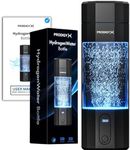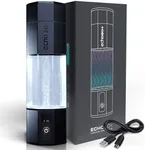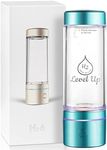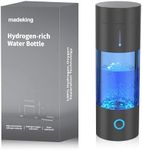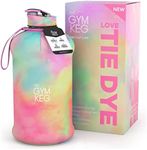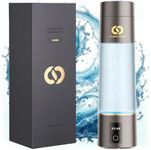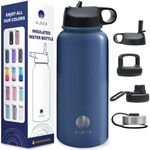Buying Guide for the Best Hydrogen Water Bottle
Choosing a hydrogen water bottle can seem confusing at first, but understanding the main features will help you find the best fit for your lifestyle. Hydrogen water bottles are designed to infuse regular water with hydrogen gas, which some believe may offer health benefits. When shopping, focus on how the bottle works, how easy it is to use and clean, and how well it fits into your daily routine. Think about where and how often you’ll use it, and what features matter most for your needs.Hydrogen ConcentrationHydrogen concentration refers to the amount of hydrogen gas that the bottle can dissolve into the water, usually measured in parts per billion (ppb) or parts per million (ppm). This is important because higher concentrations may provide more potential benefits, but extremely high levels are not always necessary for everyday use. Bottles typically range from around 800 ppb to over 1500 ppb. If you want a basic introduction to hydrogen water, a lower concentration is fine, but if you’re seeking maximum potential benefits, look for bottles that can reach higher concentrations.
Electrolysis TechnologyThis refers to the method the bottle uses to generate hydrogen. Most bottles use a process called electrolysis, where an electric current splits water into hydrogen and oxygen. Some bottles use single-chamber electrolysis, while others use dual-chamber or PEM (Proton Exchange Membrane) technology, which can produce purer hydrogen and prevent ozone or chlorine byproducts. If you want the cleanest hydrogen water, look for bottles with PEM technology, but for casual use, standard electrolysis is usually sufficient.
Material QualityThe material of the bottle affects both safety and durability. Common materials include food-grade plastic, glass, and stainless steel. Glass and stainless steel are generally more durable and do not leach chemicals, making them a good choice for health-conscious users. Plastic bottles are lighter and more portable but may not be as long-lasting. If you plan to use the bottle daily or carry it with you, consider a sturdy material that’s easy to clean and safe for repeated use.
Battery Life and ChargingHydrogen water bottles are powered by rechargeable batteries, and battery life determines how many times you can use the bottle before needing to recharge. Some bottles last for several cycles on a single charge, while others may need more frequent charging. If you’re often on the go or want to use the bottle multiple times a day, look for a model with longer battery life and convenient charging options, such as USB charging.
Ease of CleaningKeeping your hydrogen water bottle clean is important for both taste and hygiene. Some bottles have removable parts or wide openings that make cleaning easier, while others may be more difficult to maintain. If you prefer low-maintenance products, choose a bottle that’s easy to disassemble and clean, or one that is dishwasher safe.
Portability and CapacityThe size and weight of the bottle affect how easy it is to carry and how much water you can make at once. Smaller bottles are more portable and fit easily in bags, but hold less water, while larger bottles are better for home or office use. Think about where you’ll use the bottle most—if you want to take it to work or the gym, a compact, lightweight design is best, but for home use, a larger capacity may be more convenient.

